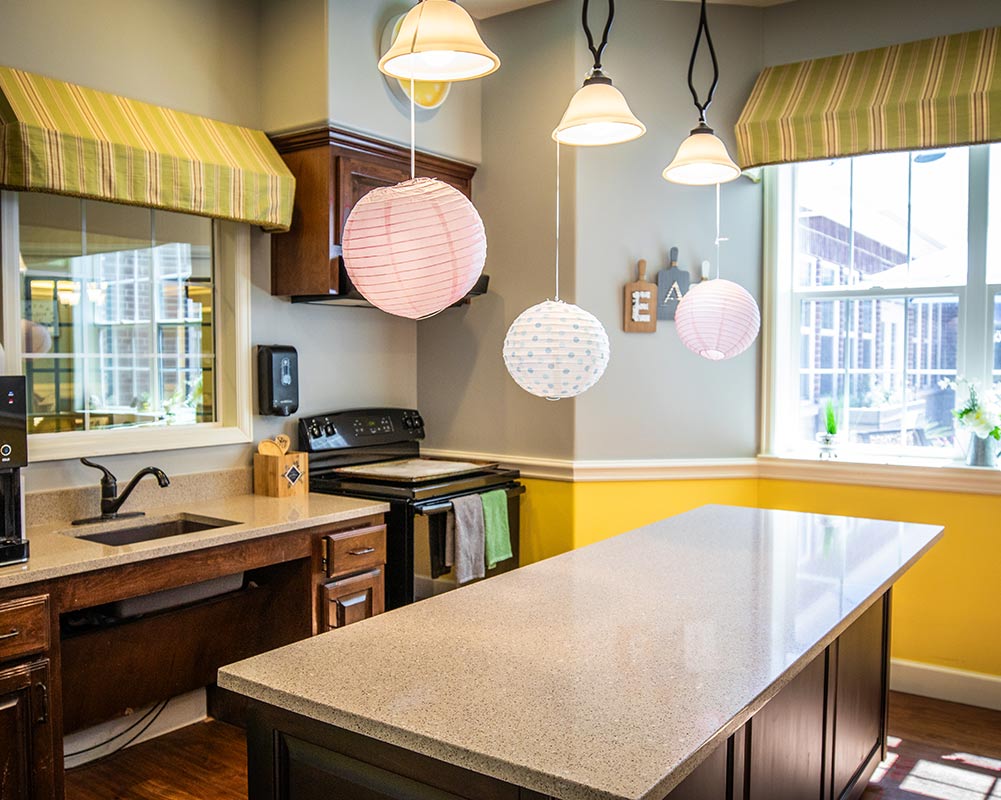Caring for a loved one with dementia is challenging, and it’s easy to feel burned out and alone. The good news is that help is available, and sometimes in some surprising places.

Caring for a loved one with dementia can be an emotionally profound and uniquely challenging journey. The role of a caregiver often extends far beyond providing physical care; it demands immense patience, understanding and empathy – and it can easily lead to isolation and burnout.
“A lot of people caring for a loved who has dementia can’t always leave their loved one alone, so they almost become isolated with the person for whom they’re caring,” says Kelsey Burback, director of sales and marketing at Encore Memory Care, which operates memory care communities in South Barrington and Crystal Lake. “Simple tasks that are easy for you and me, like running to the store, getting gas or even finding things in the home, become more challenging. Depending on how advanced their loved one’s dementia is and what their needs are cognitively and physically, that can really take a toll.”

It’s a tough journey, but it’s important for caregivers to realize they’re not alone. Each year more than 16 million Americans provide more than 17 billion hours of unpaid care for family and friends with dementia, according to the Centers for Disease Control and Prevention.
It’s important to know that help is available in many places, says Burback.
For starters, Encore Memory Care provides homelike residences that foster a familial atmosphere for seniors who have dementia and Alzheimer’s. These residences offer comprehensive support for daily tasks like meals, medication management and bathing in secure, apartment-style living environments.
And yet, not everyone is ready to send their loved one to such a facility. So, Encore Memory Care also offers support, encouragement and information to those who are on this journey – whether or not their loved one resides at an Encore community. An Encore support group that’s open to the public meets on the fourth Wednesday of every month in South Barrington and the third Monday of every month at Crystal Lake. The group provides a haven for caregivers, who find emotional support, practical advice and a sense of community. It’s designed to be a refuge where someone can relate to others who are in the same situation.
“It’s a safe space to share ideas and feelings and help each other out in a more organic way,” adds Burback. “It goes a long way when you can connect with someone and feel like they truly understand what you’re going through.”
There’s rarely a set agenda at these support group meetings. More often, each gathering caters to open dialogue, where the conversation moves wherever the group’s interests are that day. Angela Gianopoulos, a social worker at Encore’s South Barrington location, facilitates the discussion with an unbiased perspective and a gentle presence.
This is a place where individuals can share their experiences, struggles and triumphs while creating connections.
“People leave here feeling a little bit lighter,” says Burback. “I have people who’ve consistently been coming to the group for a long time, and they tell me this is what they look forward to every month.
For some, that’s their only opportunity to get out.”
Caregivers are often so weighed down with the needs of their loved one that they forget to take care of themselves. Burnout is a very real possibility, says Burback. Signs of caregiver burnout may include impatience, fatigue, and changes in eating and sleeping patterns, Burback notes.
To manage the stress, caregivers can try relaxation practices like visualization, meditation and breathing exercises, according to the Chicago-based Alzheimer’s Association. Additionally, physical activity such as a 10-minute daily walk, gardening or dancing can bolster overall well-being and mood. Regular doctor visits for oneself, a balanced diet, exercise and sufficient rest will also help, and it’s important to embrace a sense of humor throughout the journey, because this is a valuable coping mechanism.
Of course, it’s easy to talk about these things, but the reality is that caregiving is tough, and it’s often difficult to ask for help – or to know when it’s time.
“Sometimes, with a place like Encore or other residential communities, families can be hesitant to reach out because they don’t want to get sold or feel like they’re not ready,” says Burback. “Our priority first and foremost is helping families – whether they move their loved one in here or not. If there’s anyone they know who is struggling with dementia or they’re caring for someone with dementia and need help, just reach out.”
Senior communities are only one of many resources in this region. Burback encourages stressed-out caregivers to contact their local municipality for resources, as people there may have a handle on who can help. Some communities may even be able to help directly. Schaumburg, for instance, loans out durable medical equipment – crutches, walkers, bedside tables, seat risers and transfer boards – to village residents for a period of 90 days.
There are also organizations like the Barrington Area Council on Aging, which offers a wealth of resources for caregivers and support for a loved one with dementia.

One such tool is a memory cafe, which is a supportive and social gathering for individuals living with memory loss and their caregivers. These “cafes” offer a safe and understanding space to socialize, share experiences and engage in activities that support cognitive stimulation.
“Memory cafes are opportunities for a caregiver to bring their loved one to a place with other caregivers and their loved ones,” says Burback. “It’s a joint activity for them to do together, but again, it’s getting them out of the house and getting their loved one entertained while they can lean on others and receive support.”
Despite a caregiver’s best efforts, it may eventually be time to make a move to assisted living. Safety is often a pivotal question. If your loved one is susceptible to wandering, prone to falls or unable to perform fundamental tasks, assisted living facilities offer a constant of care and supervision in a secure setting. Within this environment, staff provide meaningful social engagement and a structured daily routine – both of which are critical for individuals with dementia, says Burback.
Nowadays, many individuals turn to online research for information on dementia care and senior living facilities. Typically, this process involves initiating contact, either through a phone call or an online inquiry, Burback adds.
Once they’re in touch with an expert like Burback, family members can learn more about the facility and how it can meet their loved one’s needs.
“We all have something different to offer,” she adds. “I always tell families ‘We may not always be the answer and that doesn’t mean we’re not a great community, but you know your loved ones best and what they’re looking for based on their specific needs.’”
For those feeling overwhelmed and isolated, help is nearby. The journey may be challenging, but it’s not something that should be managed alone.
“It’s one thing for me to support families through the process of getting them moved in here, but at the same time, I’m not walking their walk,” says Burback. “We’re just looking to be a resource for those families and help them through their journeys.”



















































